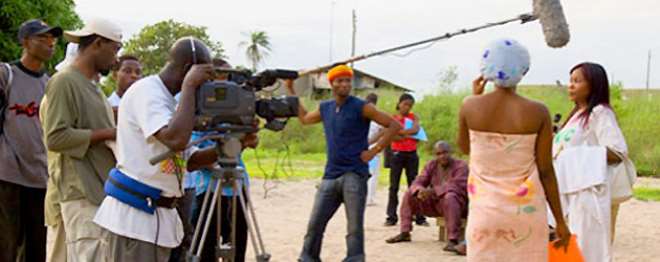NIGERIAN FILM INDUSTRY MIXES DIGITAL TECH, HOMEGROWN SCRIPTS
The Nigerian film industry is the third largest in the world, after Hollywood and Bollywood. Outside its native continent, the industry affectionately known as Nollywood remains relatively unknown. Yet millions of African fans can't get enough of its movies.
Unlike their international counterparts, the films coming out of Nollywood aren't intended for the big screen. Nigerian filmmakers use a mix of quick-and-dirty digital technology, shooting their movies entirely on digital video, editing them on home computers and delivering them to the market on VHS, DVD and video compact discs, or VCDs.
Two films, slated for screenings and release on DVD this summer, shed light on the flourishing industry. This Is Nollywood, directed by Franco Sacchi and Robert Caputo, follows Nigerian director Bond Emeruwa as he produces a feature-length action movie, Check Point, in just nine days on a budget of only $20,000, an allotment most American directors would deem incomprehensible. Welcome to Nollywood, a documentary by Jamie Meltzer, film professor at Vassar College, follows three of the hottest Nigerian directors as they race to complete films on shoestring budgets in a matter of weeks.
Both films provide a behind-the-scenes look at these sometimes seat-of-the-pants enterprises. During one scene of Welcome to Nollywood, top action-director Izu Ojukwu recalls his introduction to the movie business: Building a movie projector from scratch to host screenings in his village.
"There's an independent streak and a real pride in Nollywood, of getting across national identity and culture," says Meltzer. "Regardless of whether or not we pay attention, they're still going to make films."
Since its inception in the 1990s, the burgeoning Nigerian movie scene has bloomed into a $286 million business annually, despite the fact that films have minimal budgets (ranging from $10,000 to $25,000) and sell for just a few dollars apiece. What this industry does have is volume, with some 300 directors churning out an average of 2400 films annually. Most of the movies are in English, allowing for the widest possible crossover appeal in the multi-lingual Nigerian market.
This lightning-quick turnaround also allows directors and producers to make films with plotlines that reflect the rapidly changing political and cultural climate, often weaving in aspects of current events. Whether revolving around corruption, prostitution, folkloric legends, HIV/AIDS, cautionary tales, romantic comedies or even epic period pieces about slavery and civil wars, the films present an unfiltered view of African culture, intended for an African audience.
As Peace Anyiam-Fiberesima, founder of the Africa Movie Academy Awards, puts it in This Is Nollywood, "It's not about quality at the moment.… Africa still has people living on $1 a day, and these are the people that really watch these films."
This Is Nollywood comes out on DVD next month. Welcome to Nollywood will be shown at the Melbourne International Film Fest in Australia at the end of July, followed by a showing August 25 in Fort Green Park in Brooklyn, New York, as a summer movie screening and the Mill Valley Film Fest this October in California
Latest News
-
 "If You're For Me, I Am For You" - Cubana Chief P
"If You're For Me, I Am For You" - Cubana Chief P -
 "3 Days To Go" - Femi Adebayo Urges Fans To Get S
"3 Days To Go" - Femi Adebayo Urges Fans To Get S -
 "Stop Asking Me Questions About Speed Darlington"
"Stop Asking Me Questions About Speed Darlington" -
 "Benue Is The Most Underdeveloped State I've Ever
"Benue Is The Most Underdeveloped State I've Ever -
 Stan Alieke Urges Young Professionals To Take Lin
Stan Alieke Urges Young Professionals To Take Lin -
 Chizzy Alichi Teases Fans With Baby Reveal, Promot
Chizzy Alichi Teases Fans With Baby Reveal, Promot -
 "I'm Not Wearing Makeup From July 4th Till Decemb
"I'm Not Wearing Makeup From July 4th Till Decemb -
 "Stop The Challenge Of Mocking Kids With Down Syn
"Stop The Challenge Of Mocking Kids With Down Syn -
 Regina Daniels Celebrates Sons As They Mark Birthd
Regina Daniels Celebrates Sons As They Mark Birthd -
 Speed Darlington Threatens To Sue NAPTIP For Defam
Speed Darlington Threatens To Sue NAPTIP For Defam














